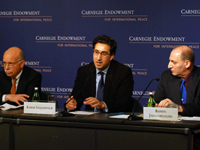Registration
You will receive an email confirming your registration.
With popular protest movements engulfing the Middle East, Iran’s opposition movement hopes to rekindle the momentum that brought millions of Iranians to the streets in the summer of 2009. Their strategy of non-violent protest, however, has so far been suffocated by the Islamic Republic’s massive security presence in the streets, willingness to use violence against protesters, mass imprisonments, and communication embargoes.
The Carnegie Endowment hosted Iranian political philosopher Ramin Jahanbegloo and Italian diplomat and author Roberto Toscano to discuss the prospects for non-violent resistance in Iran. Carnegie’s Karim Sadjadpour moderated.
Non-Violence as a Strategic Imperative
Despite the Iranian regime’s willingness to crack down on protestors with brutal force, Jahanbegloo and Toscano argued that non-violence is the best strategic option for the opposition.
- Violence does not bring democracy: Violent revolution does not allow for the kind of reconciliation and dialogue necessary to build a democracy, Jahanbegloo argued. Moderates made a mistake after the Islamic Revolution in accepting the violence of the new regime and its execution of opponents, because this set the stage for its future use of repression. It is better to be a dissident than a revolutionary, Toscano added. Dissidents always question authority while revolutionaries end up having to defend a new status -quo.
- Violence doesn’t work: Non-violent movements have historically had better records of success than violent movements, said Toscano. In Iran violent conflict would play to the regime’s strengths, Jahanbegloo argued. The regime has more weapons and is much better at using violence than the opposition, whose most powerful advantage is its moral capital.
Opposition Progress in Iran
With many opposition leaders in jail or exiled and street demonstrations put down by an overwhelming security presence, the prospects for Iran’s pro-democratic movement may appear dim. But there is significant reason for hope, said Jahanbegloo and Toscano.
- Iran’s leaders are scared: The regime would not have cracked down so hard on the opposition Green Movement if it did not feel acutely threatened by their actions, Jahanbegloo argued.
- The regime has lost legitimacy: The regime’s crackdown on peaceful demonstrators has already undermined its legitimacy among the Iranian people, said Jahanbegloo.
- The societal basis for democracy has solidified: The reform movement was not born in 2009, explained Jahanbegloo. The intellectual, student, and women’s rights movements that have been building since the end of the Iran-Iraq war and through the Mohammad Khatami presidency have established a strong civil society in Iran. When change occurs in Iran, it will be because the political culture has changed so much that the regime can no longer hold on to power, argued Toscano. That new political culture will be more sustainable.
Challenges for the Opposition
Despite this progress, the opposition faces a difficult road ahead, and must address several key obstacles:
- Leadership: The opposition lacks a clear leader, which can be both a strength and a weakness. On the one hand, the movement cannot be easily decapitated and has survived despite mass arrests of its leaders. Yet it also lacks coordination and the clear political strategy and skills needed to move beyond demonstrations, said Toscano.
- The socioeconomic factor: The Green Movement began as a largely middle-class phenomenon demonstrating for political rights in the face of a flawed election. But to build a sustainable base it will have to compete with President Mahmoud Ahmadinejad’s populist outreach and convince the lower classes that a new kind of regime will deliver social and economic progress, said Toscano. The opposition needs to get trade unions and merchants on their side, added Jahanbegloo.
- Winning over key regime actors: Iran is different from countries like Egypt and Tunisia because its military has a strong ideological association with the current regime and does not see the same potential to reinvent itself under a new political order. Protesters should still do more to reach out to individual Basij and Revolutionary Guardsmen, Jahanbegloo suggested, because some of them may be open to change. The clergy, another powerful institution in Iran, has always been divided about the idea of fused religious and political rule and many religious leaders are open to change. But they need to be convinced that they will still have a future in any new regime, added Toscano.
The International Community’s Role
A large part of the strength of the Iranian opposition is its indigenous nature, agreed the participants, and foreign actors should play only a limited role. But there are several things the international community can do:
- Be consistent in supporting human rights and democracy abroad: The Iranian regime consistently points out the hypocrisy of the United States and Europe in condemning abuses within Iran but supporting dictatorial regimes elsewhere. This undermines the West’s credibility in criticizing Iran’s record, said Toscano.
- Give indirect assistance: Direct foreign financial assistance can destroy the credibility of civic groups, said Jahanbegloo, but education programs and experience sharing by dissidents from other countries can be helpful.
- Target human rights violators: The United States has already begun to sanction Iranian officials accused of human rights violations. This is a positive step because it shows the United States cares about more than just nuclear issues in Iran, continued Toscano.
- Don’t invade Iran: Military intervention in Iran would destroy the Green Movement, warned Jahanbegloo, because it would unite the country around the regime.
